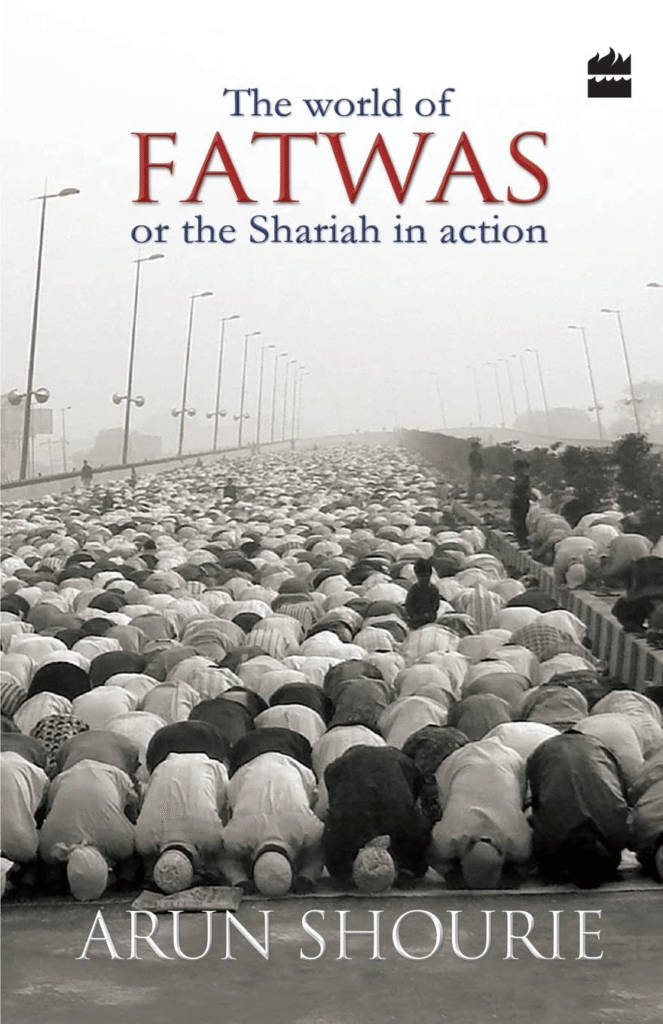Arun Shourie’s The World of Fatwas: Or the Shariah in Action is an eye-opening exploration of the historical, political, and social dimensions of fatwas in Islam. Through meticulous research and analysis, Shourie delves into the ways these religious decrees have influenced believers and non-believers alike, offering readers a profound understanding of the subject. The book challenges readers to reflect on the implications of rigid adherence to fatwas, making it a critical resource for scholars and laypeople interested in Islamic practices and their societal impact.

In The World of Fatwas, the author presents a compelling narrative that traces the evolution of fatwas over the past century, particularly in the Indian context. Shourie unpacks the deep-rooted traditions and the authoritative nature of these decrees, emphasizing their historical role in shaping the lives of Islamic followers. By highlighting key examples, such as the contentious interpretation of cow slaughter and the perception of women, the book provides a nuanced view of how fatwas have been used to enforce social norms and religious tenets.
Shourie’s The World of Fatwas investigates the profound social and religious implications of fatwas, shedding light on issues like gender inequality and interfaith relations. The book raises provocative questions about the depiction of women as sources of distress and the politicization of religious practices, urging readers to critically examine these beliefs. Shourie’s research is both thought-provoking and enlightening, making this book a valuable contribution to understanding the intersections of religion, society, and politics.
In today’s rapidly evolving world, The World of Fatwas Or the Shariah in Action serves as a wake-up call for both believers and non-believers. Shourie’s insights highlight the necessity for introspection and adaptation within Islamic communities to address the challenges of modernity. By presenting a wealth of examples and critical perspectives, the book underscores the importance of re-evaluating traditional practices to foster a more inclusive and progressive society.
This book is not merely a historical account but a profound critique of the societal impacts of religious decrees, urging readers to engage with its arguments and reflect on their broader implications.
Availability and Details of The world of Fatwas
The World of Fatwas or the Shariah in Action by Arun Shourie is a comprehensive and insightful exploration of the role and influence of fatwas in shaping Muslim life and thought. Published by Harper India, the latest edition of this book was released on 27th July 2012. With a total of 776 pages, the book offers an in-depth study of the subject. You can purchase the Kindle edition for ₹439, the paperback edition for ₹795, and the hardcover edition for ₹2990. This book is available for purchase on online platforms such as Amazon and Flipkart.
About Author of book
Arun Shourie, born on November 2, 1941, in Jalandhar, Punjab, is an Indian economist, journalist, author, and politician. He completed his schooling at Modern School, Barakhamba, and earned a bachelor’s degree in economics (Honors) from St. Stephen’s College, Delhi. He further pursued a doctorate in economics from the Maxwell School of Citizenship and Public Affairs at Syracuse University, completing it in 1966.
Shourie began his career as an economist with the World Bank and later served as a consultant to the Planning Commission of India. Transitioning into journalism, he became the editor of prominent Indian newspapers, including the Indian Express and The Times of India. His tenure in journalism was marked by investigative reporting and a commitment to press freedom, earning him the Ramon Magsaysay Award in 1982.
In the political arena, Shourie was a member of the Bharatiya Janata Party (BJP) and served as a Member of Parliament in the Rajya Sabha from 1998 to 2010. He held several ministerial positions in the Vajpayee administration, including Minister of Communications and Information Technology, Minister of Commerce and Industry, and Minister of Development of North Eastern Region.
As an author, Shourie has written extensively on various subjects, including governance, religion, and social issues. His book “Falling Over Backwards: An Essay Against Reservations and Judicial Populism” critically examines the policy of reservations in India, arguing for governance that focuses on individuals rather than interest groups or communities.
Throughout his career, Shourie has been known for his critical views on organized religion and has expressed skepticism about its role in society. His personal experiences, including caring for his son with special needs and his wife’s health challenges, have deeply influenced his perspectives, as reflected in his writings.
Arun Shourie has authored numerous books that have garnered both national and international recognition. Some of his notable works include We Must Have No Price, Where Will All This Take Us?, Harvesting Our Souls, Indian Controversies, The World of Fatwas, A Secular Agenda, and Falling Over Backwards. His literary contributions and achievements have earned him prestigious honours such as the Padma Bhushan and the Dadabhai Naoroji Award.
In recognition of his contributions to literature and public affairs, Shourie was awarded the Padma Bhushan, India’s third-highest civilian award, in 1990.
Arun Shourie’s multifaceted career spans economics, journalism, politics, and writing, marked by a steadfast commitment to individual-centric governance and critical analysis of societal structures.
Themes Explored in The world of Fatwas
Influence of Iqbal on Islamic Thought: In The world of Fatwas, the author critiques the intellectual contributions of Muhammad Iqbal, whose reformist ideas clashed with the rigid orthodoxy upheld by the Ulema. Iqbal’s calls for a re-examination of Islamic practices and his advocacy for Ijtihad (independent reasoning) were seen as controversial, even heretical, by traditionalists. The book illustrates how Iqbal’s views, though progressive and intellectually stimulating, were largely rejected by the conservative elements within the Muslim community, highlighting the tension between reformist ideas and traditional religious authority. This resistance to change is attributed to the deep-rooted influence of the ulema and the reliance on literal interpretations of religious texts.
Fatwas and Secularism in India: A significant portion of the book The world of Fatwas critiques the relationship between secularism and Islam in India. Shourie criticizes the secular establishment for overlooking the power and influence of fatwas in favour of appeasing Muslim religious leaders. He argues that this accommodation of fundamentalist views contributes to the perpetuation of discriminatory practices under the guise of religious freedom. The author also critiques the hypocrisy of secularists who support such views while claiming to uphold democratic principles of equality.
Shourie’s Critique of Secularism and Religious Intolerance: Shourie’s critique of secularism is also significant. He questions the secular narrative that attempts to treat all religions equally without recognizing the inherent contradictions in practices like fatwas. He discusses in The world of Fatwas how secularists often avoid engaging with uncomfortable truths about Islamic practices, particularly those that conflict with the modern democratic ideals of equality and individual rights. Shourie argues that such false equivalence undermines the values of a democratic society.
The Ongoing Influence of Islamic Law: The final theme in The world of Fatwas addresses the pervasiveness of Shariah and fatwas in contemporary Muslim life. Shourie highlights how the texts of fatwas, the Quran, and Hadis continue to hold immense authority in shaping the beliefs and actions of Muslims. Even in modern times, the interpretations of these religious texts continue to dictate the actions of millions. Shourie argues that these norms, while entrenched in tradition, should be scrutinized for their relevance to contemporary society.
The Derivative Nature of Indian Scholarship: In The world of Fatwas, the author discusses how Indian intellectualism tends to mirror Western scholarship, often overlooking indigenous issues like the fatwa system. This derivative approach has led to a lack of serious academic exploration into fatwas within India. Intellectuals, particularly in the post-colonial era, often rely on Western theories without critically engaging with traditional practices that have deep cultural significance in India, such as fatwas. The book highlights how this scholarly reluctance stems from a fear of political and religious backlash, especially when fatwas challenge contemporary societal norms.
The Hidden World of Fatwas: The book The world of Fatwas begins by exploring the hidden world of fatwas, which are religious rulings issued by Islamic scholars. Shourie highlights how these fatwas affect various aspects of life for Muslims in India, but remain largely unknown or misunderstood by the broader public. The absence of intellectual focus in India on the fatwas is discussed, along with the reluctance of both secularists and liberal Muslims to openly engage with the reality of these decrees, for fear of angering the powerful ulema (Islamic scholars). The author questions why fatwas, rooted in centuries-old interpretations of Islam, still hold such significant power today.
The Politics and Power of the Ulema: In The world of Fatwas, the influence of Ulema (Islamic scholars) is examined in depth and who issue fatwas, showing their profound impact on Muslim society through fatwas. The Ulema’s legal opinions shape the moral, social, and political conduct of Muslims, often preserving conservative religious views. The book elaborates on the political dimensions of the fatwa, citing the example of Maulana Ahmad Riza Khan, whose fatwas contributed to the shaping of Muslim political ideology. The author examines how these religious rulings are often conservative and unchallenged, even when they contradict contemporary values. The relevance of Shariah in today’s world is a central concern, particularly with regard to women’s rights, marriage, and divorce.
Gandhi’s Role and the Impact on Muslim Community Dynamics: The book The world of Fatwas also critiques Gandhi’s role in the Khilafat Movement, which significantly impacted Hindu-Muslim relations in India. Gandhi’s unwavering support for the movement empowered conservative Islamic forces, including the Ulema, by validating their political influence. The book explores how this support led to a strengthening of orthodox Muslim political ideology, ultimately causing a rift between Gandhi and certain Muslim leaders, exemplified by the shifting stance of the Ali brothers. Gandhi’s efforts to unite Hindus and Muslims through the Khilafat Movement inadvertently empowered conservative religious elements at the expense of broader social harmony.
The Role of Fatwas in Regulating Muslim Society: A key theme in The world of Fatwas is the role of fatwas in regulating the behaviour of Muslims in a strict, often inflexible manner. The book illustrates how fatwas are not just religious decrees but powerful tools that govern daily life, including issues of family law, such as divorce and marriage. The author highlights how fatwas uphold conservative interpretations of Islamic law and reinforce traditional social norms, limiting individual freedoms within the Muslim community. This rigidity, the book argues, creates a cultural barrier to modernity and progressive reform. He highlights controversial fatwas concerning practices like cow slaughter, and the treatment of women, especially in matters of marriage and divorce. The concept of conditional divorce, which has its roots in texts dating back centuries, is scrutinized for its continued existence in modern-day fatwas. Shourie suggests that these practices, though rooted in traditional interpretations, are often contradictory to modern ethical values and should be reinterpreted.
Secularism’s Clash with Islamic Orthodoxy: The world of Fatwas explores the clash between secularism and Islamic orthodoxy in India, particularly in relation to the fatwa system. While India’s secular framework aims to create a pluralistic society, the book shows how fatwas, issued by conservative Islamic scholars, often contradict the values of secularism. Secularists, in the context of Indian politics, find it difficult to challenge the fatwa system, as doing so risks alienating the Muslim community or being accused of undermining religious freedom. The tension between secular ideals and the influence of fatwas is a central concern in the book, showcasing the challenges India faces in balancing these competing ideologies.
Fatwas as Tools of Control: A central argument in The world of Fatwas is that fatwas serve as tools of control within Muslim communities. The author argues that fatwas are used by religious and political authorities to maintain social order and suppress dissent. These fatwas are not merely religious opinions but often serve to enforce political agendas, limit individual freedom, and ensure conformity to traditional Islamic practices. The book delves into how fatwas, particularly those issued by influential Islamic scholars, exert significant power over the lives of Muslims, both socially and politically, thereby maintaining the status quo within Muslim society.
Political Influence of Fatwas: The political implications of fatwas are also explored, with Shourie pointing out how fatwas are used as a political tool to influence communities. One example given is the role of fatwas during the Khilafat Movement led by Gandhiji, where religious leaders issued fatwas to steer Muslim political action. Shourie argues that this intersection of religion and politics has led to the continued control of religious leaders over the Muslim community, affecting everything from political stances to social norms.
These themesof The world of Fatwas, coupled with the detailed analysis presented in the book, allow readers to gain a deeper understanding of the way fatwas and Islamic jurisprudence impact modern Muslim societies.
Why You Should Buy The world of Fatwas
You should buy The world of Fatwas because it offers an insightful and critical exploration of the fatwa system, its historical roots, and its profound impact on society. The book challenges conventional views by revealing how fatwas shape not only personal lives but also political and social landscapes. Arun Shourie’s well-researched arguments encourage readers to critically engage with the influence of religious authority and its intersection with politics. Whether you are interested in Islamic law, contemporary religious issues, or Indian politics, this book provides a thought-provoking and essential perspective.
Final Thought
The world of Fatwas offers a critical examination of the fatwa system in India, highlighting the complex interplay between religion, politics, and society. Through its in-depth analysis, the book sheds light on how fatwas have served as instruments of control and political power, often reinforcing conservative ideologies that resist progressive reform. It also critiques the influence of intellectuals and political leaders, particularly Gandhi, whose actions inadvertently empowered orthodox forces. The author’s insights into the misinterpretation of Sharia law and fatwas in secular India invite readers to consider the nuances of these religious practices, urging for a more informed and open dialogue. As the book asserts, Fatwas are not just religious opinions; they are powerful tools that shape political and social thoughts. By acknowledging the significant role of fatwas in Muslim society, The world of Fatwas calls for a balanced approach to secularism, where religious traditions can evolve alongside contemporary values. Ultimately, the book highlights the importance of critical engagement with religious practices in a modern, pluralistic society, advocating for a more progressive and inclusive discourse.




